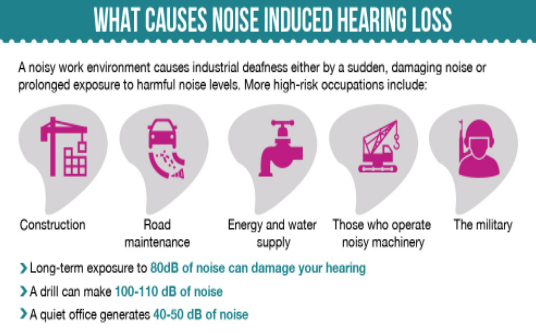What is Noise-Induced Hearing Loss?
Noise-induced hearing loss (NIHL), as its name suggests, is a common type of loss, resulting from excessive exposure to harsh noise and sounds. We are exposed to a variety of sounds every day and it can be difficult to avoid certain noises on a daily basis. Often, these sounds are not damaging enough to cause us trouble, but when they become too loud, they can result in temporary and even lasting damage. The harm caused to the inner ear or eardrum could even be irreversible. In many cases, noise-induced hearing loss can be categorized as sensorineural hearing loss. This loss is permanent and requires hearing aids to effectively manage the impairment.
 This type of hearing loss can, at times, be attributed to the workplace. Many careers are not hearing-friendly such as industrial professions. See our blog: 10 most risky jobs for your hearing for more information on work-related hearing loss. Furthermore, it is not only our job which can be a key cause. Noise pollution can be incredibly damaging to our ears. Some of the most popular sources of noise pollution are:
This type of hearing loss can, at times, be attributed to the workplace. Many careers are not hearing-friendly such as industrial professions. See our blog: 10 most risky jobs for your hearing for more information on work-related hearing loss. Furthermore, it is not only our job which can be a key cause. Noise pollution can be incredibly damaging to our ears. Some of the most popular sources of noise pollution are:
 The hearing check will indicate if you should take further action to protect your hearing. We recommend that should you have any concerns about your auditory health, that you consult an audiologist, healthcare professional or ENT doctor.
The hearing check will indicate if you should take further action to protect your hearing. We recommend that should you have any concerns about your auditory health, that you consult an audiologist, healthcare professional or ENT doctor.
Causes of Noise-Induced Hearing Loss
Noise-induced hearing loss can be caused suddenly or develop over time. For example, both a spontaneous loud bang or a constant exposure to high volumes for an extensive period of time can lead to hearing loss. This type of hearing loss can, at times, be attributed to the workplace. Many careers are not hearing-friendly such as industrial professions. See our blog: 10 most risky jobs for your hearing for more information on work-related hearing loss. Furthermore, it is not only our job which can be a key cause. Noise pollution can be incredibly damaging to our ears. Some of the most popular sources of noise pollution are:
This type of hearing loss can, at times, be attributed to the workplace. Many careers are not hearing-friendly such as industrial professions. See our blog: 10 most risky jobs for your hearing for more information on work-related hearing loss. Furthermore, it is not only our job which can be a key cause. Noise pollution can be incredibly damaging to our ears. Some of the most popular sources of noise pollution are:
- Rapid population growth
- Vehicular noise from trains, planes, and even emergency services
- Industrial or workplace noise
- Everyday sounds
How Does Noise Damage Hearing?
It is the damage to or even death of ear hair cells that lead to hearing loss. When high-intensity sound enters the ear canal, it can cause trauma to the hair cells and other parts of the ear. Ultimately, this trauma damages how we hear, affecting how we perceive sound moving forward. It is this damage from high dB noise that weakens our ability to process sounds.When Does Sound Become Harmful?
We are constantly exposed to all sorts of sounds every single day, and a lot of the time it is difficult to avoid loud noises. But, when does sound become dangerous? It is the sounds that exceed 85dB that we need to wary of. It is estimated that sounds from busy city traffic measure around the 85dB mark. Even the sound levels from loud music can cause hearing loss or tinnitus, however, this is more common in musicians. It is the continuous exposure to loud noise that can damage our cells in the inner ear and auditory nerve, resulting in noise-induced hearing loss.Possible Symptoms of Noise-Induced Hearing Loss
As with any hearing impairment, symptoms may vary from person to person. Depending on the root cause of noise-induced hearing loss, different signs may be present. For example, an instant loss of hearing due to noise may present different symptoms to a loss which has occurred gradually over time. Below are some indicators:- Muffled hearing
- Loss of high pitched sounds
- Vertigo
- Tinnitus
- Physiological complications such as damage to ear hair cells, inflammation or synaptic change
- Permanent hearing loss
How To Prevent Noise-Induced Hearing Loss
It can be tricky to avoid hazardous noises. After all, sound is everywhere. Depending on our lifestyles, some people are more likely to be at risk than others. There are a number of precautions we can take to help reduce the risk of hearing damage:- Wear earplugs when present in high-noise environments such as gigs or those above 85 dB.
- Wear work-appropriate protection if your job requires it.
- If you cannot directly influence the volume, find a safer place that is quieter.
- Inform others around you that an area or event could have harsh consequences on our hearing.
- Take a test to check for hearing loss.
Noise-Induced Hearing Loss Treatment
Whether your impairment is temporary or permanent, there are a number of steps you can take to manage the loss. When the ability to hear properly is affected and the loss is permanent, digital hearing aids can be relied on to appropriately manage the condition. At Hearing Direct, you will find a variety of devices to assist mild to moderate impairments. Our HD 91 is one of our entry-level model ideal for those seeking affordable hearing aids with the essential amplification features. For a more advanced device, try the HD 250.Test Your Hearing
If you suspect you could be experiencing noise-induced hearing loss, take our free online hearing test. The hearing check will indicate if you should take further action to protect your hearing. We recommend that should you have any concerns about your auditory health, that you consult an audiologist, healthcare professional or ENT doctor.
The hearing check will indicate if you should take further action to protect your hearing. We recommend that should you have any concerns about your auditory health, that you consult an audiologist, healthcare professional or ENT doctor.
Additional Resources
Should you seek extra information, our blog features a range of articles, guides, tips, and reviews. We think some of the following posts are ideal for further reading:- Different types of hearing loss explained
- How to spot hearing loss in teens
- Hearing loss in one ear
- A guide to age-related hearing loss
- Meniere's disease: Causes, symptoms and treatment
